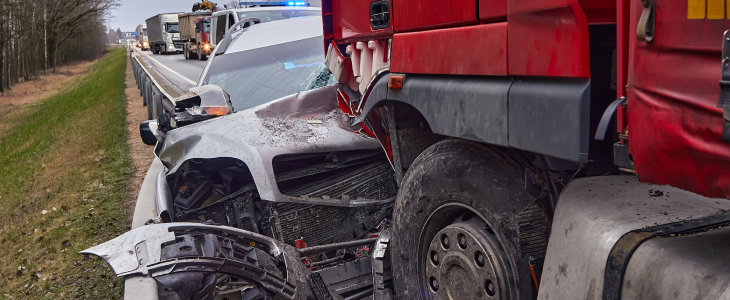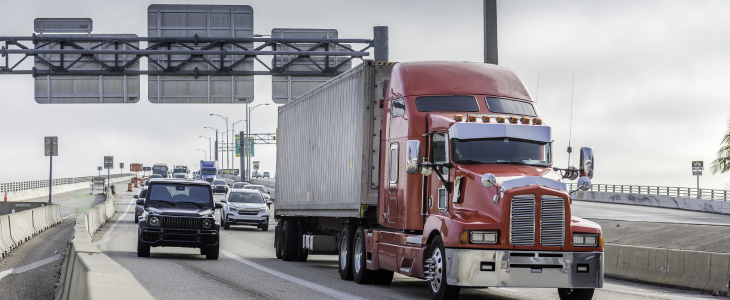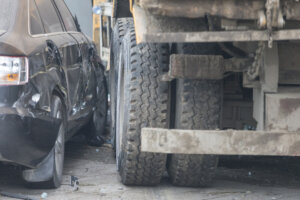At Pringle & Herigstad, P.C., we understand the unique challenges these cases present in North Dakota. This comprehensive guide will walk you through the personal injury claims process, from the immediate actions you should take following an accident to navigating the intricate negotiations with insurance companies.
Common Causes of Truck Accidents in North Dakota
Truck accidents can occur for various reasons, often resulting from multiple factors. Some of the most common causes include:
- Driver Fatigue: Long hours on the road can lead to exhaustion, impairing a driver’s reaction time and judgment.
- Distracted Driving: Using mobile devices, eating, or other distractions can divert attention from the road.
- Speeding: Excessive speed can make it difficult for a truck to stop quickly or navigate turns safely.
- Improper Maintenance: Failing to properly maintain brakes, tires, or other critical components can lead to mechanical failures.
- Overloaded or Improperly Loaded Cargo: Excess weight or unbalanced loads can affect a truck’s stability and handling.
- Weather Conditions: North Dakota’s severe weather, including ice and snow, can create hazardous driving conditions.
No matter the cause, we will work to identify the responsible parties, hold them accountable, and fight for every dollar you deserve.
Immediate Steps After a Truck Accident
After a truck accident, taking immediate steps is crucial to protect your safety and preserve your legal rights. Here’s what you should do:
- Ensure Safety: If possible, move to a safe location away from traffic and check for injuries. Call 911 immediately to report the accident and request medical assistance.
- Seek Medical Attention: Even if you feel fine, get a medical evaluation as some injuries may not be immediately apparent.
- Document the Scene: Take photos of the accident scene, including vehicle damage, road conditions, and visible injuries. This evidence can be vital for your claim.
- Gather Information: Exchange contact and insurance information with the truck driver and other parties involved. Also, collect contact information from witnesses.
- Avoid Admitting Fault: Be cautious with your words. Avoid admitting fault or making statements that could be used against you later.
- Notify the Authorities: Cooperate with law enforcement and provide them with accurate information about the accident.
These steps can significantly impact your ability to file a successful personal injury claim. Acting promptly and carefully can help protect your interests and ensure you have the evidence and documentation to support your case.
Documenting the Accident and Your Injuries
Documenting the accident and your injuries is critical in building a solid personal injury claim. Thorough and accurate documentation can help establish the extent of your injuries, the impact on your life, and the circumstances of the accident.
First, take detailed photographs of the accident scene. Capture multiple angles of the vehicles involved, visible damage, road conditions, skid marks, and traffic signals or signs. This visual evidence can be instrumental in illustrating how the accident occurred.
Next, document your injuries. Take photos of any visible injuries immediately after the accident and throughout the recovery process. This can help demonstrate the severity and progression of your injuries over time. Keep a journal detailing your physical and emotional condition, noting any pain, discomfort, or limitations you experience. This personal account can be a powerful complement to medical records.
It’s also essential to gather all medical documentation. This includes hospital records, doctor’s notes, diagnostic tests, and prescription information. These records provide a professional assessment of your injuries and the treatment required.
If you miss work due to your injuries, document any lost wages. Keep copies of pay stubs, work schedules, and any correspondence with your employer regarding your absence. This can help quantify the financial impact of the accident.
Lastly, secure a copy of the police report. This official document often contains critical details about the accident, including witness statements and the officer’s observations.
Meticulous documentation strengthens your claim and can significantly impact the compensation you receive. At Pringle & Herigstad, P.C., we assist clients in gathering and organizing this vital information to support their cases.

Dealing With Insurance Companies
Dealing with insurance companies after a truck accident can be complex and sometimes frustrating. Handling communications carefully is essential to protect your interests and ensure you receive the compensation you’re entitled to. Below, we outline the steps to take when notifying your insurance company and offer tips for handling insurance claims.
When to Notify Your Insurance Company
Notifying your insurance company immediately after a truck accident is crucial. Timely reporting helps initiate the claims process and ensures your insurer is aware of the incident. Here are some key steps to follow:
- Contact Your Insurer Promptly: Notify your insurance company within 24 to 48 hours of the accident. Delays can complicate the claims process and may even result in coverage being denied.
- Provide Basic Information: Share essential details about the accident, including the date, time, location, and a brief description of what happened. Avoid giving a detailed statement until you’ve consulted with an attorney.
- Obtain a Claim Number: Request a claim number and contact information for the adjuster handling your case. This will help you keep track of your claim and follow up as needed.
Notifying your insurance company promptly is an essential step in protecting your rights and beginning to seek compensation. Our truck accident attorneys can guide you through the process and handle all communications with your insurer.
Tips for Handling Insurance Claims
The insurance claims process can be challenging, especially after a truck accident. Here are some tips to help you handle your claim effectively:
- Be Honest and Accurate: When providing information to your insurer, be truthful and precise. Misrepresentations can lead to complications or denial of your claim.
- Document Everything: Keep detailed records of all communications with the insurance company, including emails, letters, and phone calls. Note the date, time, and content of each interaction.
- Avoid Speculating: Stick to the facts when discussing the accident. Avoid guessing or speculating about details you are unsure of, such as the extent of your injuries or the specifics of the accident.
- Don’t Settle Too Quickly: Insurance companies may offer a quick settlement lower than you deserve. Take time to understand the full extent of your damages before accepting any offer.
- Consult an Attorney: Before signing any documents or agreeing to a settlement, consult with an experienced attorney. They can help ensure your rights are protected and that you receive fair compensation.
Our team handles insurance claims carefully and diligently, working to level the playing field and protect our clients’ rights.
Understanding Your Legal Rights
All drivers on the road have a duty of care to operate their vehicles safely and responsibly. However, truck drivers and trucking companies are often held to a higher standard due to commercial trucks’ size and potential danger. This elevated responsibility includes adhering to specific regulations and ensuring their vehicles are well-maintained and their drivers are adequately trained.
When to Consult a Personal Injury Lawyer
It’s advisable to consult a personal injury lawyer as soon as possible after a truck accident. Early legal consultation can be critical in preserving evidence and protecting your rights. A lawyer can help you understand the complexities of truck accident cases, which often involve multiple parties, such as the truck driver, trucking company, and possibly other drivers.
If you’ve sustained significant injuries, incurred substantial medical expenses, or experienced lost wages, an attorney can help you assess the full extent of your damages and pursue appropriate compensation. Additionally, if the insurance company disputes liability or offers an insufficient settlement, a lawyer can negotiate on your case to court if necessary.
Consulting a personal injury lawyer ensures you have an experienced advocate in your corner, fighting for your best interests. Trust Pringle & Herigstad to guide you through the legal process and secure the compensation you deserve.
Benefits of Hiring a Truck Accident Attorney
Hiring a truck accident attorney can provide numerous advantages, especially when dealing with the complexities of such cases. Here are some key benefits:
- Knowledge of Truck Accident Laws: Truck accident cases often involve specific laws and regulations that differ from standard car accidents. A knowledgeable attorney understands these intricacies and can effectively navigate them to your advantage.
- Thorough Investigation: An experienced attorney can conduct a comprehensive investigation into the accident, gathering crucial evidence such as truck driver logs, maintenance records, and eyewitness testimonies. This can help establish liability and strengthen your case.
- Dealing with Multiple Parties: Truck accidents often involve several parties, including the driver, trucking company, and potentially other drivers. An attorney can manage communications and negotiations with all parties, ensuring your interests are represented.
- Negotiating with Insurance Companies: Insurance companies may attempt to minimize your compensation. A skilled attorney can negotiate on your behalf, working to secure a fair settlement that reflects the full extent of your injuries and damages.
- Representation in Court: If your case goes to trial, having an attorney with courtroom experience can be invaluable. They can present your case effectively, advocate for your rights, and seek maximum compensation.
Our firm is committed to providing the legal support you need to navigate the aftermath of a truck accident and secure the compensation you deserve.

Evaluating Compensation for Truck Accident Claims
Evaluating compensation for truck accident claims involves understanding the extent of your injuries and their impact on your life. Due to the sheer size and weight of commercial vehicles, truck accidents often result in severe injuries. Accurately assessing your damages is crucial for ensuring you receive fair compensation.
Common Injuries in Truck Accidents
Truck accidents can cause a range of serious injuries, including:
- Traumatic Brain Injuries (TBI): These can have long-term effects on cognitive and physical abilities.
- Spinal Cord Injuries: These may result in partial or complete paralysis.
- Fractures and Broken Bones: Often require extensive medical treatment and rehabilitation.
- Internal Injuries: Damage to organs can be life-threatening and may require surgery.
- Whiplash and Neck Injuries: Common in rear-end collisions and can lead to chronic pain.
Understanding the nature of your injuries can help you evaluate the necessary medical treatment and potential long-term impacts on your life.
Available Damages
In a truck accident claim, you may be entitled to various types of damages, including:
- Medical Expenses: Covers current and future medical bills related to your injuries.
- Lost Wages: Compensation for income lost due to inability to work during recovery.
- Pain and Suffering: Compensation for physical pain and emotional distress.
- Property Damage: This covers the cost of repairing or replacing your vehicle.
- Loss of Consortium: Compensation for the impact on your relationship with your spouse.
Evaluating these damages accurately ensures you pursue the full compensation you deserve. At Pringle & Herigstad, P.C., we are dedicated to helping you assess and claim the compensation necessary to aid your recovery and rebuild your life after a truck accident.
Navigating Fault and Liability
Determining fault and liability in truck accident claims in North Dakota involves understanding specific state laws and regulations. North Dakota is a no-fault state, meaning most personal injury claims must be submitted to your auto insurance company. This no-fault insurance, or Personal Injury Protection (PIP), covers medical expenses and lost wages up to $30,000 regardless of who caused the accident.
Exceeding the No-Fault Threshold
If your injuries exceed the no-fault threshold—such as medical expenses surpassing $2,500 or you sustain severe and permanent disfigurement or disability lasting more than 60 days—you can pursue compensation from the at-fault driver. This requires proving the other driver’s fault, which can be established through various forms of evidence, including police reports, witness statements, and photographs of the accident scene.
Comparative Negligence in North Dakota
North Dakota follows a modified comparative negligence rule. You can recover damages if you are less than 50 percent at fault for the accident. If you are found to be 50 percent at fault, you cannot recover any damages. Your percentage of fault will reduce your compensation. For example, if you are found to be 30% at fault, your total compensation will be reduced by 30 percent.
Evidence to Prove Fault
Proving fault is critical in truck accident claims. Key pieces of evidence include:
- Police Reports: Official documentation of the accident, including any citations issued.
- Witness Statements: Testimonies from individuals who saw the accident occur.
- Photographs and Videos: Visual evidence of the accident scene, vehicle damage, and visible injuries.
- Driver Logs and Maintenance Records: For truck drivers, these can provide insight into compliance with federal regulations and potential negligence.
Navigating these legal complexities requires a thorough understanding of North Dakota’s auto claims laws and the ability to gather and present compelling evidence. At Pringle & Herigstad, P.C., our experienced attorneys have the skills and resources to handle these intricate cases, ensuring your rights are protected and you receive the compensation you deserve.

Legal Process and Settlement Negotiations
The legal process and settlement negotiations in truck accident claims can be complex and time-consuming. Understanding the key stages and strategies can help you navigate this process more effectively. This section outlines the critical steps and provides strategies for maximizing your compensation.
Key Strategies in the Personal Injury Claims Process
- Initial Consultation with an Attorney: The first step is to consult with an experienced truck accident attorney. They will evaluate your case, explain your legal rights, and outline the best course of action.
- Investigation: A thorough investigation is essential. Your attorney will gather evidence, such as police reports, witness statements, and medical records, to build a strong case.
- Filing the Claim: Your attorney will file a personal injury claim with the appropriate insurance companies, detailing the extent of your injuries and damages.
- Demand Letter: A demand letter is sent to the at-fault party’s insurance company, specifying the compensation you seek. This letter includes detailed information about your injuries, medical treatments, lost wages, and other damages.
- Negotiations: The negotiation phase involves discussions between your attorney and the insurance company. Your attorney will advocate for a fair settlement that covers all your damages.
- Mediation: If negotiations do not lead to a satisfactory settlement, mediation may be the next step. It involves a neutral third party who helps facilitate a mutually agreeable resolution.
- Litigation: If mediation fails, your attorney may file a lawsuit and take your case to court. This step involves presenting your case before a judge or jury to seek the compensation you deserve.
Our team is here to guide you through each step of the legal process and ensure you receive the compensation you deserve.
Why Choose Pringle & Herigstad, P.C.?
Choosing the right law firm to handle your truck accident case is crucial for ensuring you receive the compensation you deserve. At Pringle & Herigstad, P.C., we offer unparalleled expertise and personalized service to guide you through the complexities of your personal injury claim. Our experienced team is dedicated to providing comprehensive legal support tailored to meet each client’s unique needs.
Our services include:
- Thorough Case Evaluation: We conduct a detailed assessment of your case to identify the best legal strategies.
- Evidence Gathering: Our team meticulously collects and preserves crucial evidence, including accident reports, witness statements, and medical records.
- Expert Negotiation: We have seasoned negotiators who engage with insurance companies to secure fair settlements.
- Litigation: We are prepared to take your case to court to fight for your rights.
- Client Communication: We maintain open lines of communication, keeping you informed at every stage of the process.
- Medical Referrals: We can refer you to trusted medical professionals to ensure you receive the best care.
We understand the devastating impact a truck accident can have on your life. Our firm has a proven track record of success, having secured substantial settlements and verdicts for our clients. Trust Pringle & Herigstad, P.C. to provide the compassionate, effective representation you need to navigate the aftermath of a truck accident and secure the compensation you deserve.
Contact Our North Dakota Truck Accident Lawyers Today
If you or a loved one has been involved in a truck accident, don’t navigate the aftermath alone. The experienced attorneys at Pringle & Herigstad, P.C. are here to provide the guidance and support you need. We offer free consultations to evaluate your case and discuss the best action to pursue compensation.
Reach out today to schedule your consultation. Our dedicated team is ready to fight for your rights and help you secure the compensation you deserve. Contact us now and take the first step towards recovery and justice.
Pringle & Herigstad, P.C. is committed to supporting individuals in North Dakota, including Grand Forks, Minot, Fargo, Bismarck, Williston, Rugby, Devils Lake, Jamestown, and the surrounding areas. Our dedicated team is here to provide legal assistance and guidance to those facing the complex challenges that arise from these incidents.
